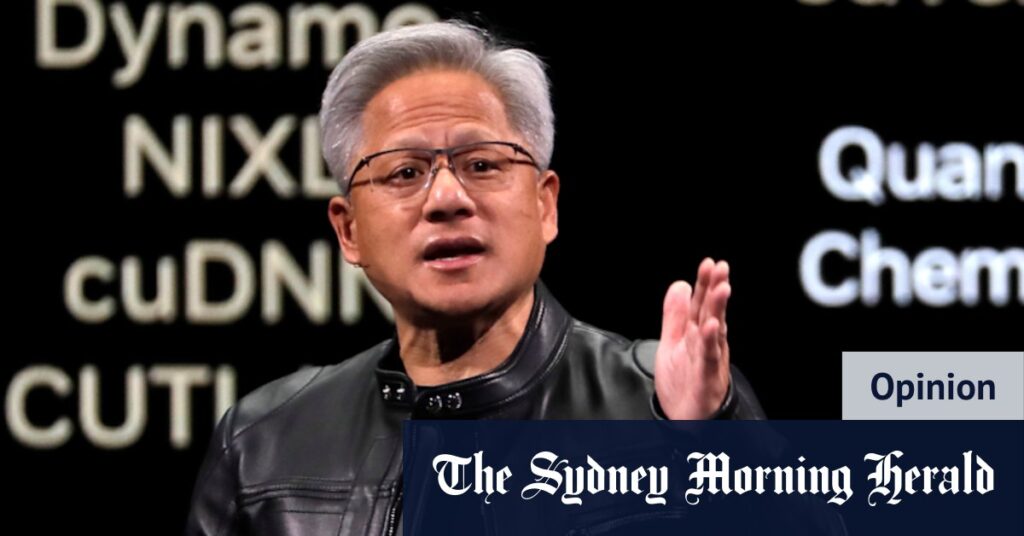
Just 112 days after reaching the $4 trillion milestone, Nvidia has become the first company to achieve a $5 trillion valuation. This remarkable feat underscores the company’s pivotal role in the ongoing AI revolution, with its market value now representing over 8% of the S&P 500. The surge is largely driven by the increasing demand for AI technologies, which heavily rely on Nvidia’s cutting-edge chips.
The announcement comes as major tech giants like Microsoft, Meta, and Amazon scramble to integrate Nvidia’s hardware into their data centers, underscoring the chipmaker’s dominance in the AI sector. According to Wedbush analysts, “there is only one chip in the world fueling this AI Revolution … and it’s Nvidia.”
Jensen Huang: The Visionary Behind Nvidia’s Success
Nvidia’s CEO, Jensen Huang, often referred to as the “Godfather of AI,” has been instrumental in steering the company through this transformative period. This week, Huang reassured investors and the public that Nvidia’s growth is sustainable and not a speculative bubble. The company anticipates half a trillion dollars in revenue over the next five quarters, driven by bookings for its latest chips.
Huang highlighted the diverse applications of Nvidia’s technology, which extend beyond traditional AI uses. The company is making strides in sectors such as self-driving cars with partners like Uber and Lucid Motors, AI-enhanced cybersecurity with CrowdStrike Holdings, pharmaceutical research with Eli Lilly & Co., and even quantum computing.
“This is quite extraordinary,” Huang remarked, emphasizing Nvidia’s expansive influence across various industries.
Challenges and Strategic Moves
Despite its successes, Nvidia has faced challenges. In September 2024, concerns about production delays of its latest chip, Blackwell, led to a 13% drop in stock value. Additionally, there were fears that China’s DeepSeek might disrupt US tech sector spending on hardware, but these concerns have since dissipated.
Looking ahead, Nvidia’s growth could be further bolstered by potential agreements between US President Donald Trump and Chinese President Xi Jinping. If successful, these talks might allow Nvidia to sell its most advanced chips to China, a market eager for superior hardware.
Meanwhile, Nvidia continues to expand its influence through strategic investments, such as a recent $1 billion investment in Nokia Oyj. However, the company’s reliance on Taiwan for chip production and potential regulatory scrutiny over its proprietary AI software remain areas of concern.
The Broader Impact of Nvidia’s Growth
Nvidia’s ascent from a company known for enhancing video game graphics to a cornerstone of the global economy is a testament to its strategic vision and innovation. The company’s dominance in the AI chip market has positioned it as a critical player in what some describe as a new industrial revolution.
However, this unprecedented growth also poses risks. Nvidia’s role as a single point of failure in the AI supply chain could have significant implications if disruptions occur. The company’s future success will depend on the broader adoption of AI technologies by consumers and businesses, which is necessary to justify its substantial capital investments.
As Nvidia continues to shape the future of technology, its journey serves as a reflection on the evolving landscape of Big Tech and its impact on the global economy. The company’s $5 trillion valuation is not just a financial milestone but a symbol of its transformative influence on industries worldwide.
The Business Briefing newsletter delivers major stories, exclusive coverage, and expert opinion. Sign up to get it every weekday morning.






